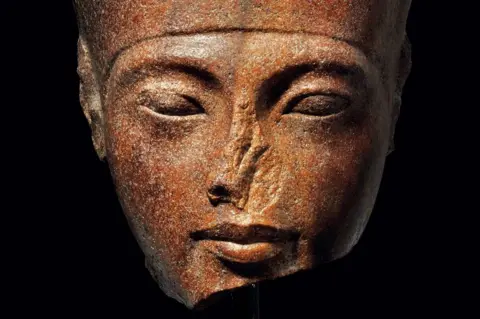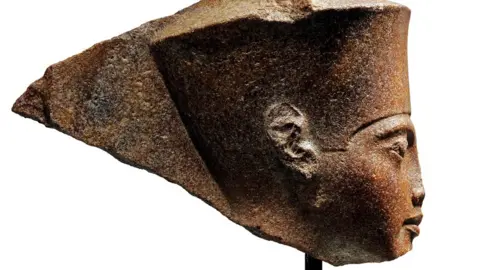Egypt to sue Christie's to retrieve £4.7m Tutankhamun bust
 AFP
AFPEgypt says it will instruct a law firm in the UK to file a civil suit over the sale last week of a Tutankhamun bust.
The sculpture of the pharaoh was bought for £4.7m ($6m) at Christie's auction house in London, despite Egypt warning it was probably stolen in the 1970s.
Antiquities Minister Khaled al-Enany told the BBC that he would try to repatriate the artefact.
Christie's said all necessary checks were made over the bust's provenance, and that its sale was legal and valid.
It stated that Germany's Prince Wilhelm von Thurn und Taxis reputedly had it in his collection by the 1960s, and that it was acquired by an Austrian dealer in 1973-4.
The 3,000-year-old, brown quartzite bust was part of a statue of the God Amun, the most important deity of the New Kingdom, according to Christie's.
The auction house said the facial features were the same as those of the young pharaoh, who ruled between 1333 and 1323BC.
Similar representations of Amun, also with Tutankhamun's facial features, were carved for the Temple of Karnak in the city of Thebes (modern-day Luxor), it added.
Before Thursday's auction, at which 32 other Egyptian artefacts were also sold, Christie's said the bust had been "well published and exhibited in the last 30 years", and that it had established the recent ownership.
But the Egyptian embassy in London complained to the UK Foreign Office that the sale was "inconsistent with relevant international treaties and conventions".
Egypt's former antiquities chief, Zahi Hawass, said the bust appeared to have been "stolen" in the 1970s from the Temple of Karnak. "The owners have given false information," he told AFP news agency. "They have not shown any legal papers to prove its ownership."
On Monday night, the Egyptian National Committee for Antiquities Repatriation (NCAR) expressed its "deep discontent of the unprofessional way in which the Egyptian artefacts were sold without the provision of the ownership documents and proof that that the artefacts left Egypt in a legitimate manner".
"The NCAR also expressed deep bewilderment that the British authorities failed to provide the support expected from it in this regard," a statement said.
 Christie's Auction House
Christie's Auction HouseThe committee announced that it had decided to instruct a British law firm to file a civil lawsuit over the sale of bust, and that it would also ask Interpol to issue a circular to "track down the illegal sale of Egyptian artefacts worldwide".
"They left us with no other option but to go to court to restore our smuggled antiquities," Mr Enany told the BBC.
"We will leave no stone unturned until we repatriate the Tutankhamun bust and the other 32 pieces sold by Christie's. This is human heritage that should be on public display in its country of origin."
The BBC understands that a number of Egyptian businessmen and civil society groups have pledged to fund the lawsuit.
The UK has also been asked to prevent the export of Egyptian artefacts before Egyptian authorities have checked ownership documents, Egyptian sources say.
Christie's reiterated on Tuesday that it had "clearly carried out extensive due diligence" on the Tutankhamun bust.
"We recognise historic objects can give rise to complex discussions about the past; our role today is to continue to provide a transparent, legitimate marketplace upholding the highest standards for the transfer of objects from one generation of collectors to the next," a statement said.
"Christie's would not and do not sell any work where there isn't clear title of ownership and a thorough understanding of modern provenance."
